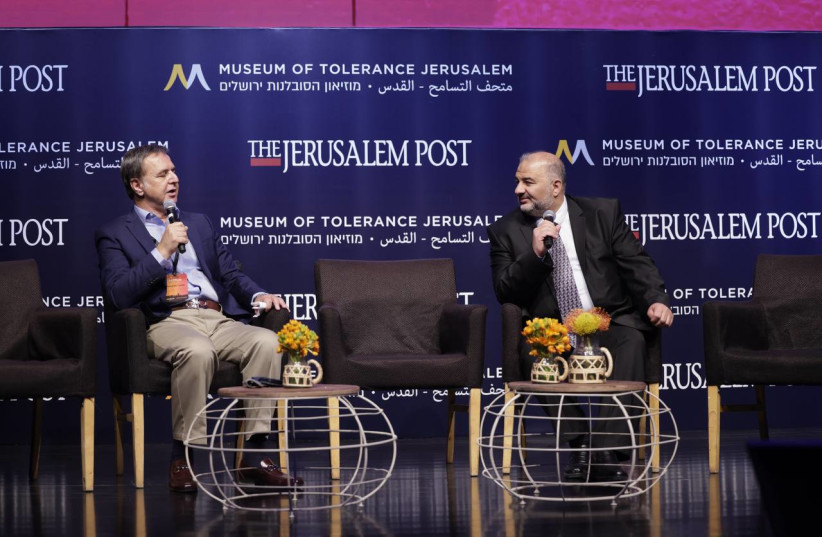The "special status" of Israel's Arab citizens – on one hand, full citizens of Israel, on the other Palestinian Arabs – are situated in a position to serve as a bridge between Jewish Israelis and Palestinians to achieve peace and tolerance, Ra'am MK Mansour Abbas said at The Jerusalem Post's "Celebrate the Faces of Israel" conference at the Museum of Tolerance Jerusalem on Thursday morning.
Ra’am’s goal was to serve as this bridge, Abbas added in his conversation with the Post’s Palestinian affairs correspondent Khaled Abu Toameh.
“As Arab Palestinians, we want to promote peace in the holy land between the peoples. Therefore, this special status provides an opportunity for both people to connect together.“
This is why Israeli-Arabs should not be dragged by Palestinian factions towards acts of violence that could deepen the schism between the peoples, Abbas added.
“The model that we are trying to create is one of the shared civil values that provide an opportunity for both peoples to live together,” he said.

The value that Israel needs most is tolerance, both between Jews and Arabs and between people within each community, Abbas added.
"Tolerance is a universal, humane value that brings all people together without differentiating between religion, race or sex."
MK Mansour Abbas
“Tolerance is a universal, humane value that brings all people together without differentiating between religion, race or sex. Therefore, even though I am a representative chosen to represent the sector who chose me, my commitment is to all of Israel’s citizens,” Abbas said.
An example of his involvement in issues pertaining all of Israeli society and not just the Israeli-Arab sector was his call for dialogue between the coalition and opposition over the government's controversial judicial overhaul, the Ra'am chairman said.
Violent crime is number one issue for Israeli-Arab society
However, the number one challenge for Israeli-Arab society is the issue of violent crime – and this will eventually spill into the other sectors of Israeli society if not treated, Abbas warned, adding that criminal organizations have ballooned to a point where they can only be solved with significant government intervention.
“I came to the Knesset four years ago with the goal of fighting crime. I was elected on this platform. Since then, I have been working through different challenges to fight this phenomenon and promote partnership between all citizens,” he said.
“In the previous government we were able to lower crime by 15% in one year, and the government approved a number of plans for the Arab sector. Unfortunately, in this government we have less influence, and that is why we see that the number of homicides in the Arab sector has doubled since the beginning of the year,” Abbas added.
Asked whether he would consider joining the current coalition in order to gain more influence, Abbas said that while his initial position was that he was willing to work with politicians from both sides of the aisle, in the current political reality the government is trying to promote issues that were unacceptable to his party.
The prime minister decided to form a far-right coalition that he believes in, and Ra’am cannot impose itself on it, even though in the last two years the party did conduct negotiations with Likud, and has never disqualified the right wing in Israel, Abbas said.
“What drives us is the desire to influence, and such influence cannot be achieved through parliamentary tools, only through government policy tools,” he concluded.